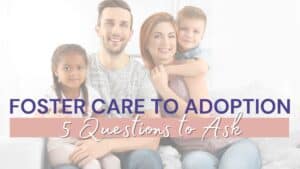
Foster Care to Adoption: 5 Questions to Consider
If you’re hoping to adopt a child, becoming a foster parent is often a great way to bring into your home a child who may,

How adoptive parents can sensativley share their child’s adoption story with them.
Adoptive parents face a unique task. They need to share their child’s adoption story with them, while demonstrating compassion and cultural sensitivity. Following are five principles for sharing the story:
When you share your child’s adoption story, adapt it so that it is developmentally appropriate. Honesty is the foundation of healthy communication.
Words are powerful because they have meaning. Too often when talking about adoption, adults tend to use words that give a negative impression. An example of this is the phrase “Why were you put up for adoption?” This leads the adoptee to feel like a piece of merchandise marketed to the highest bidder. Other words such as “adopted out” or “given away” or “real parent” do not accurately describe the adoption experience. Therefore, we must use words and phrases that define adoption positively.
By using positive and accurate language, we educate others about adoption. We choose emotionally ‘correct’ words over emotionally-laden words. We speak and write in appropriate adoption language with the hopes of influencing others so that this language will someday be the norm.
| Accurate Language | Less Accurate Language |
| Birthparent | Real parent, natural parent |
| My child | Adopted child; own child |
| Choosing an adoption plan | Giving away, giving up your child |
| Finding a family to parent your child | Putting your child up for adoption |
| Deciding to parent the child | Keeping your baby |
| Person / Individual who was adopted | Adoptee |
| To parent | To keep |
| Child in need of a family | Adoptable child; available child |
| Parent | Adoptive parent |
| International or inter-country adoption | Foreign adoption |
| Child who has special needs | Handicapped child, hard to place |
| Child from another country | Foreign child |
| Was adopted | Is adopted |
| Birth relative | Blood relative |
It is important to know, specifically for older adopted children, what the abuse or neglect was — because it happened to them. We should talk about life experiences they lived through. They may have been pre-verbal when it happened, but it does not mean they do not remember. Children can also be good detectives, interviewing others (siblings or other relatives) and/or looking through parents’ papers to find information. They may also remember more than parents realize. Failing to provide an atmosphere where a child can ask difficult questions is like allowing an elephant to live in the middle of the family living room. There is always a sense that something is not being talked about. Children learn early on from the open or closed communication environment just how they are to handle sensitive issues — whether to tiptoe around them or deal with them directly.
The realities of a child’s life should not be withheld. However, some of these truths should be shared with demonstrated compassion toward the child who may have been neglected, abused, or abandoned. There are probably no parents who ever, as children, dreamed of becoming drug addicts or felons. Yet they did. Sometimes people become entangled in horrendous life circumstances in which they make choices that would be different if their lives had taken other paths. Poor choices do not justify wrong actions, but perhaps a truthful but compassionate perspective will lead a child to understand and maybe one day forgive her birth parents.
A child should have control over his or her own story. Of course, parents love to share the story of how their child came to them. That is good. They love to share stories of an anecdotal nature. That’s good as well. However, what should be kept for only the child to tell when he chooses are the difficult parts of the story. Those things remain private.
It is not the adult’s responsibility or choice to share the story of a child’s past physical, emotional or sexual abuse, abandonment or trauma. It is not the adult’s responsibility to fill in all the gaps in the child’s story to those outside the family. Once a parent does that, the child has lost control of information that is only his to tell when he is ready, wants to or needs to.
The child should be told that his adoption story is for him to tell.